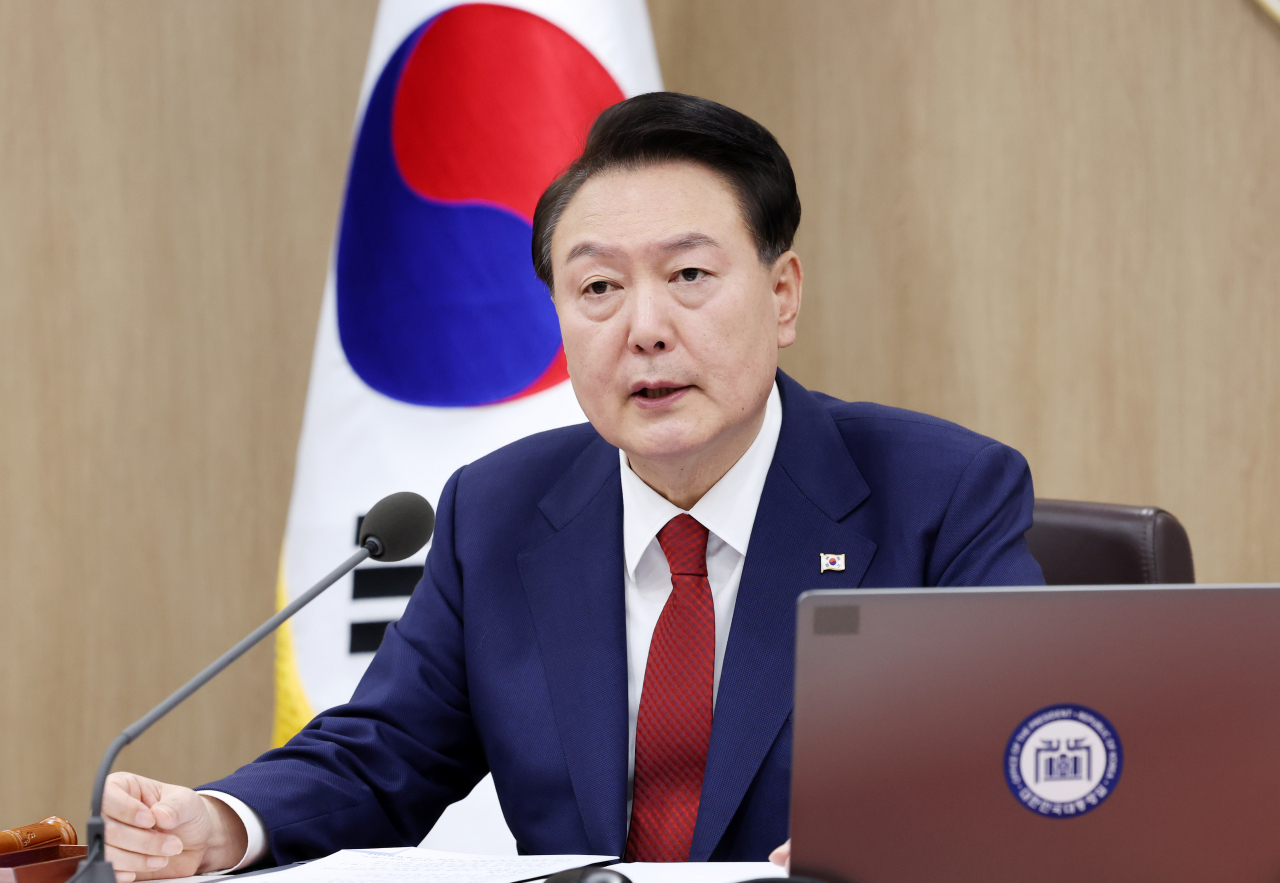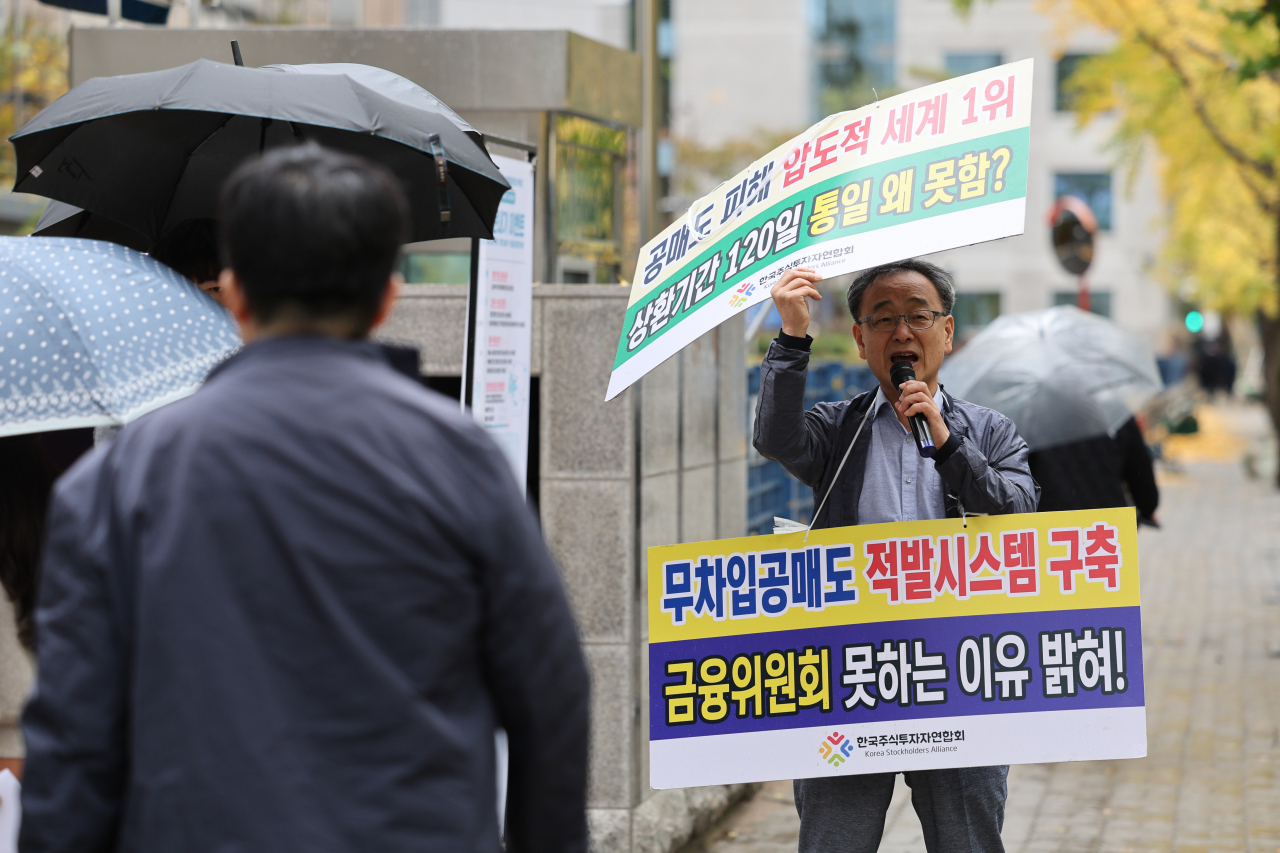 |
President Yoon Suk Yeol speaks during a Cabinet meeting held Tuesday at the presidential office. (Yonhap) |
President Yoon Suk Yeol on Tuesday defended Seoul financial regulators' recent decision to reimpose a ban on short selling in the South Korean stock market through June 2024, saying the ban is necessary to protect retail investors.
The remarks came as the government is intensifying its fight against illegal short sellers, blaming them for the recent bearish trend in the stock market, and instead appealing to individual investors, with about five months to go until the general elections for the National Assembly on April 10, 2024.
"Failure to address problems from illegal short selling hinders price discovery of the market in a fair process, causing individual investors to take huge losses and at the same time undermining public trust in the stock market," Yoon said at a Cabinet meeting in his office.
Before the short selling ban, reimposed more than two years after being partially lifted in May 2021, short sellers on the Korean stock market were allowed to borrow shares that they believe would decline in value and then sell them, in the hopes of making a profit by buying them back at a lower price before returning them to the original owners. The practice without borrowing shares before selling them -- known as naked short selling -- has always been illegal.
Earlier in October, Korea's regulatory agency the Financial Supervisory Service revealed that the Hong Kong-based investment banking arms of BNP Paribas and HSBC shorted a combined 56 billion won ($42.2 million) in stocks without borrowing shares to avert losses. Later on Oct. 31, FSS said it would inspect all short trades by investment banks active here since May 2021, and on Nov. 6, the FSS established a special team to investigate short selling activities.
The disclosure by the FSS added fuel to the debate over the necessity to strengthen penalties. According to FSS data compiled by Rep. Hwang Un-ha of the Democratic Party of Korea, none of the 174 illegal short selling perpetrators -- including 156 foreign entities -- faced criminal punishment from 2010 to August this year, although Korean law stipulates that illegal short selling is punishable by at least one year of imprisonment.
The Korea Exchange's main bourse, the Kospi, has suffered high volatility over the past few months. The index saw a 15 percent fall over two months to the end of October from a peak in August. But overall, the bourse rose 5.9 percent from January to Nov. 3, just before the short selling ban was announced over the weekend.
Yoon said that the decision to reimpose the ban on short selling was necessary, despite concerns that it will hamper Korea's inclusion in the MSCI Developed Markets Index, considering the high level of retail investor participation in the stock market here.
Morgan Stanley Capital International currently lists Korea on the MSCI Emerging Markets Index, but Seoul has long eyed an upgrade.
 |
Jung Eui-jung (right), who heads an advocacy group representing retail investors, stages a protest calling on the financial authorities to tackle deficiencies in the system against short sellers on Monday in front of the Korea Exchange office in Yeouido business district in Seoul. (Yonhap) |
Korea's sole stock market operator, the KRX, runs the Kospi as well as the tech-heavy Kosdaq. It is overseen by the regulatory Financial Services Commission.
Over 14.2 million individuals here held at least one share listed on Korea's stock market as of the end of 2022, and those categorized as individual investors accounted for 98.8 percent of all shareholders, according to data from the Korea Securities Depository.
Yoon asked the financial authorities to create a "level playing field" and seek fundamental plans for improvement to prevent retail investors from taking losses due to short selling activities.
"The short selling ban will not be lifted until the fundamental solutions are out there to prevent further damage (to individual investors)," Yoon said. "I believe (the short selling ban) will eventually enhance the Korean stock market's competitive edge in the long run."
Rep. Kweon Seong-dong of the ruling People Power Party on Friday proposed a bill to strengthen penalties for illegal short sellers, such as larger penalty fines.
Following Tuesday's meeting, Yoon is poised to fly to San Francisco on Wednesday to attend a meeting of the Asia-Pacific Economic Cooperation and the Indo-Pacific Economic Framework later this week. Yoon said he expects the leaders of APEC member countries to discuss supply chain diversification and ways to boost trade and investment between countries that produce a combined 60 percent of the world's gross domestic product.
Returning to Seoul on Saturday, Yoon will again leave for Europe to visit London and France.
Yoon told his Cabinet that Seoul and London are poised to adopt the "Korea-UK Accord," which maps out a direction for future bilateral cooperation.
"The United Kingdom is the second-largest economy in Europe, but its trade volume with Korea falls short of those of Korea-Germany and Korea-Italy," Yoon said.
"The state visit to UK will take bilateral cooperation to the next level, buttressed by plans to allow Korean companies to have a bigger presence in the UK and to bolster cooperation in cutting-edge technology supply chains," he added.







